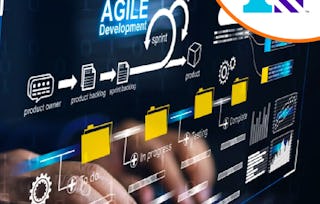The primary objectives of this course are to introduce business process concepts and strategies. You will learn how to understand and specify the flow of work responsibility and movement of information throughout an enterprise. For businesses to maximize the benefits of technology, they must transform their ad-hoc and often poorly defined ways of doing things to formal business processes. In addition, you will explore frameworks for business process management. You will also learn about the importance of business mapping as well as how to analyze stakeholders and keep them involved in the process.

Agile Business Processes: Systems for Operational Success
Ends soon: Gain next-level skills with Coursera Plus for $199 (regularly $399). Save now.

Agile Business Processes: Systems for Operational Success

Instructor: Shannon Pettiford
Included with
Skills you'll gain
Details to know

Add to your LinkedIn profile
See how employees at top companies are mastering in-demand skills

There are 4 modules in this course
In this module, we'll discover today's business landscape, where organizations grapple with challenges that may hinder their competitiveness. Technological advancements, changing consumer preferences, and unpredictable market dynamics create an environment where the only constant is change. Legacy systems and organizational structures can impede an organization's ability to adjust accordingly. This inability to adapt, leverage insights from data, and adopt proactive-thinking culture can stifle progress within organizations. The only clear path forward is to adapt to this evolving terrain. Adapting to new technologies (i.e., AI), developing a culture of innovation, and encouraging a mindset open to continuous improvement are vital for organizations to stay competitive.
What's included
1 video16 readings2 assignments1 discussion prompt
In this module, we will learn about business process mapping and how it offers numerous benefits to improve efficiency and lead to greater productivity. Business process mapping is the cornerstone of understanding and improving organizational workflows. It involves identifying, analyzing, and visualizing processes to streamline operations.
What's included
1 video11 readings3 assignments
In this module, you will learn about business analysis, business models, and how to gather and prioritize requirements. You will learn about the series of plans that help document and set business expectations, which contribute to a business’s success. You will learn what goes into a plan as well as how to draft an effective one. We will also explore the role of the business analyst and how understanding such a role can improve your work as an engineer.
What's included
1 video25 readings5 assignments1 peer review
In this module, we will look into strategies for keeping our stakeholders engaged. Through lessons in stakeholder analysis, mapping, and engagement, you will learn how to take a strategic approach to identify, understand, and involve stakeholders throughout the project lifecycle.
What's included
2 videos17 readings2 assignments1 peer review1 discussion prompt
Prepare for a degree
Taking this course by Northeastern University may provide you with a preview of the topics, materials and instructors in a related degree program which can help you decide if the topic or university is right for you.
Instructor

Offered by
Explore more from Data Management
 Status: Free Trial
Status: Free TrialIllinois Tech
 Status: Free Trial
Status: Free Trial Status: Free Trial
Status: Free Trial Status: Free Trial
Status: Free TrialPolitecnico di Milano
Why people choose Coursera for their career




Frequently asked questions
To access the course materials, assignments and to earn a Certificate, you will need to purchase the Certificate experience when you enroll in a course. You can try a Free Trial instead, or apply for Financial Aid. The course may offer 'Full Course, No Certificate' instead. This option lets you see all course materials, submit required assessments, and get a final grade. This also means that you will not be able to purchase a Certificate experience.
When you purchase a Certificate you get access to all course materials, including graded assignments. Upon completing the course, your electronic Certificate will be added to your Accomplishments page - from there, you can print your Certificate or add it to your LinkedIn profile.
Yes. In select learning programs, you can apply for financial aid or a scholarship if you can’t afford the enrollment fee. If fin aid or scholarship is available for your learning program selection, you’ll find a link to apply on the description page.
More questions
Financial aid available,
¹ Some assignments in this course are AI-graded. For these assignments, your data will be used in accordance with Coursera's Privacy Notice.





